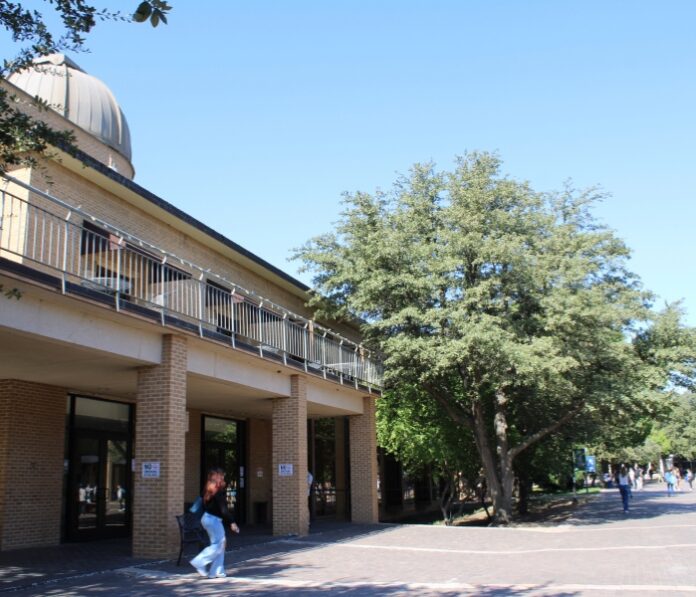
Cultivating wellness, wonder and worship through scientific inquiry
Disclaimer: All articles published under this section are the opinions of the respective authors and do not necessarily reflect the opinions of The Cor Chronicle
We have a science problem at the University of Dallas. There isn’t enough of it.
In our little liberal arts bubble, science is scarcely important to everyday discussions, despite its classification as a liberal art. With all the important emphasis on the liberal arts, the average student takes two science courses. These introductory courses largely emphasize memorization of basic and unhelpful scientific concepts for those largely uninterested in the sciences.
This is quite alright while we populate this tiny hill and exist in an alternate reality. But we leave here as missionaries of the transcendentals, ill-prepared to engage with a culture based so deeply on the scientific method.
If we cannot understand a conversation on public health or struggle to speak with our child’s pediatrician, “the Iliad” can only be of so much help.This is why we all need to understand and cultivate scientific curiosity. Sure, making inquiries about the deeper meaning in Melville’s “Moby Dick” is very important, and debating the works of Aristotle is vital to the formation of the heart. However, we are people of many great and varied talents.
Each individual person on this campus very likely possesses at least two completely unrelated and advantageous talents. We are all very intelligent and fascinating people, which is why we have the capacity to step into both the worlds of the humanities and the physical sciences.
We can have our hearts molded by the Core while also wanting earnestly to understand how we find our bodies ravaged by this vale of tears. A simplistic answer to our ills is “the human condition”. While true, this is overly simplistic and unintellectual. Ultimately, you are not above this natural world and the physical realities herein.
Why should you cultivate scientific inquiry? Have you ever been to the doctor, for yourself or another, and did not understand what they were telling you? Knowledge is empowering.
Society talks a great deal about taking charge of one’s health, and I think that this shift from more laissez-faire consumption habits to a more mindful philosophy is really important. However, without a background in the sciences, an understanding of basic scientific principles, or a desire to question and investigate, those trying to learn can easily find themselves at the hands of a pseudoscientist or “snake oil salesman.”.
What is pseudoscience? In the most basic terms, it is a set of beliefs or practices mistakenly thought to be based on the scientific method. The scientific method is the basic hypothesis-experiment relationship that governs every form of scientific inquiry. Without rudimentary understanding of this cornerstone, one can become prey to the maliciously opportunistic.
People work very hard to deceive hard-working people into spending gargantuan sums of money on their “treatments.” From the extreme. far-gone world of lobotomies to today’s insidious world of expensive supplements promising “wellness,” these people want both your cash and your commitment.
This is why we must think critically about what others want us to do. Especially in regard to your own health, it is important to ask questions, and ask many of them. If your questions are met with hostility, go elsewhere.
Some will argue that a lot of what I am saying can also apply to modern allopathic and osteopathic medicine and its practitioners. Bludgeoning calls to “trust the science” are ineffective and condescending, which is why I am not using that appeal. The medical community has its issues. From pushing particular agendas to disregarding pertinent information, they have lost the trust of many.
The answer to this untrustworthiness, however, is not to completely disregard centuries worth of scientific discoveries. Rather, it is education. Ask questions. Read peer-reviewed journals. Advocate for yourself with evidence-based facts. The physician-patient relationship cannot be one-sided.
Alongside an apathy for the scientific method, there is this bizarre idea that studying the sciences is only possible alongside either a blatant rejection of religious truths or a temporary suspension of any broad ethical considerations. When describing how hemoglobin delivers oxygen throughout the body to a classmate of mine, they replied that the Lord was keeping them alive and that alone was all that matters.
This mentality, while seemingly pious, feels a bit misguided. Studying the sciences has never diminished my own faith in Christ. Rather, it has increased it in so many ways I cannot fully describe.
All of creation fits so perfectly; often, it can seem like He is showing off with the grandeur of creation. In Luke 19:40, we are told that even if we neglect to praise Him, creation will cry out in praise.
We humans are rather fickle. Yet even as we neglect our prayers and good works, choosing actively to ignore Him, the aurora borealis still dazzles the skies, ATP synthase still generates ATP, and the world still spins on its axis.
We skip out on one of the most profound ways to worship and discover the Lord by writing off the study of what he created. I am not saying we must study every single biochemical process that sustains us, but we ought to understand that every intricately designed natural process praises its Maker.
Bio: Claire Wingfield is a senior biochemistry major.
